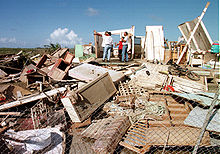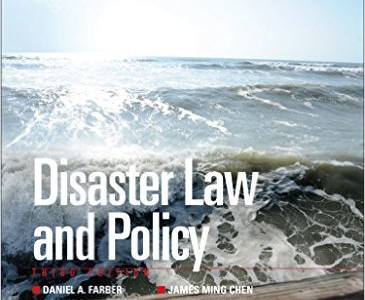Hurricane Katrina
LGBTQ People Face Greater Climate Risks
A new study by the UCLA Williams Institute finds that LGBTQ people in same-sex couples are at greater risk of exposure to the harms of climate change compared to straight couples.
In August of 2005 when Hurricane Katrina made landfall in Louisiana and Mississippi, the combination of torrential rain and flawed infrastructure proved deadly. More than 1,800 people died and the price tag for the damage quickly rose to the tens of billions of dollars. In the chaotic disaster response that followed, several communities were disproportionately …
Continue reading “LGBTQ People Face Greater Climate Risks”
CONTINUE READINGWhat the Administration Failed to Learn from Past Disasters
There are some basic rules about how to respond to emergencies. They were ignored.
An epidemic and a hurricane require different responses. But the organizational challenge of confronting an emergency is a constant. Here are some basic rules the Trump Administration failed to heed. Ensure in advance that sufficient supplies will be quickly available. When Hurricane Katrina hit, the government did have supplies, but they were located hundreds …
Continue reading “What the Administration Failed to Learn from Past Disasters”
CONTINUE READINGRebuilding: Lessons from Katrina and Sandy
Recent experience shows that rebuilding is a slow, frustrating process.
We’ve had experience with the rebuilding process twice in the past dozen years, after Hurricanes Katrina and Sandy. The storm destruction takes place in a matter of days, but rebuilding takes years — just like the difference between the instant it takes to break a leg and the subsequent weeks of wearing a cast. Houston …
Continue reading “Rebuilding: Lessons from Katrina and Sandy”
CONTINUE READINGDisaster Law and Policy
A new textbook on the emerging field of Disaster Law.
I’m delighted to announce the publication of the third edition of Disaster Law and Policy. Although I might not normally use this blog to promote a new book, I’d like to think in this case this is more than just shameless self-promotion. That’s for two reasons: the lion’s share of the credit for the improvements …
Continue reading “Disaster Law and Policy”
CONTINUE READINGNew Symposium on Disaster Law
The Duke Environmental Law and Policy Forum has just published a great symposium on disaster law. The authors include some leading lights in environmental law, and for good reason, since disaster issues and environmental law are closely related. Here are links to all of the individual articles: Articles Introduction: Legal Scholarship, the Disaster Cycle, and …
Continue reading “New Symposium on Disaster Law”
CONTINUE READINGGoing Beyond the “Design-Basis Event”
A conventional approach to safety is based on the concept of design events. A building code might say, for example, that a building should be able to survive a 7.0 earthquake. This approach has been basic to the regulation of nuclear reactors. As the interim report of the post-Fukushima NRC task force explains: [The regulation[ …
Continue reading “Going Beyond the “Design-Basis Event””
CONTINUE READING“Facing Catastrophe”: A Roadmap to a Safer Future
Rob Verchick’s new book, “Facing Catastrophe: Environmental Action for a Post-Katrina World,” might help avoid future disasters like the Deepsea Horizon blowout. Verchick views wetlands, lakes, forests, and rivers as a kind of infrastructure, providing ecosystem services that are just as important as the services provided by other infrastructure such as roads and dams. For …
Continue reading ““Facing Catastrophe”: A Roadmap to a Safer Future”
CONTINUE READINGThree Ingredients of Disaster
The organizational failures that led to the Gulf blowout were similar to those that resulted in the failure of the New Orleans levees during Katrina.
CONTINUE READINGCan You Teach an Old Corps New Tricks?
Five years of Katrina, the Corps may be trying to mend its ways — but is it succeeding?
CONTINUE READINGFour Years Later, and Still No Real Plan
A new report by the National Research Council gives “thumbs down” to the Army Corps’ plans for preventing another Katrina disaster. This is the kind of planning that we simply have to learn to do right– not just for the sake of those immediately at risk, but because rising sea level and more extreme weather …
Continue reading “Four Years Later, and Still No Real Plan”
CONTINUE READING







